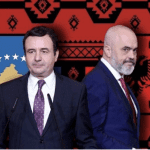By Fatos Lubonja
The most disgusting thing, but at the same time absurd, unacceptable, repulsive and intolerable, which has characterised politics and the politicians in our country (traditionally), is the exercising of that irresponsible and arrogant “pragmatism,” according to which “all means may be used in political battles, ignoring the fact that these “means” could be totally against the interests of societyŢ
I believe we all know that our politics have been and still are permeated by this spirit. This is not news. It is no rocket science to understand that our Opposition hopes and prays, day and night for snow to fall, for power cuts, all the set backs possible, so that the Government will fall as soon as possible; because the last thing the Opposition wants is for the Government to create election standards, let alone score a success. In the final account, has not Edi Rama called this Majority an “invading” force? On the other hand, no great intelligence is called for to grasp the fact that the Majority hopes and prays that the Opposition will make as many ‘faux pas’ as possible, hopefully even refuse to participate in the elections, for the sole reason of allowing the Majority to rule without any trouble. Suffice it to mention that all the Majority requires is the support of the Internationals.
What could be said when you find yourself up against a situation like the situation of this Winter, which has jeopardised having elections in the country and which brings back to centre-stage the image of a primitive Albania, a pre-democratic country, is that this kind of pragmatism has its own periods when it is implemented in a peaceful manner and periods when it is exercised with virulence. This Winter we are experiencing one of its explosive phases which makes us focus even more profoundly on this pragmatism. This virulent period could, in other words, be summed up with the well known expression, “our side must make things as bad as possible for the other side so our side reaps the rewards.”
If we go back into the history of these two parties, we would soon draw the conclusion that things could not have been otherwise, because this political class has this kind of pragmatism rooted deep in its genes, inherited from the Mother that spawned it. (Enver Hoxha managed to isolate Albania for his own power, with spine-chilling, destructive consequences.) Let us not forget that, in the period of ’91, after losing the first elections of 31 March, the DP commenced a destabilization action that resulted in mass scale looting and shocking destruction. The philosophy was that the worst possible situation had to be created for the government, so that it could be declared powerless and then early elections announced. And in fact the action was a success, although it must be admitted that at the time there were many factors, also psychological, which justified it. ’97 was also characterised by this philosophy practiced by both parties, I would say.
The Opposition could hardly wait for the situation created by the collapse of the pyramid schemes, because when their votes were stolen in 1996 it was incapable of creating any truly civil, political movement. Even when the crisis reached its climax it thought exclusively of its own power. However, on the other hand, Berisha preferred to create a situation of North-South chaos and civil unrest, which brought the Internationals to Albania, prior to his departure from the scene.
From those years to date many things have changed. And here, it is well worth while reflecting on how far we have advanced in reducing this kind of irresponsible pragmatism of our politicians-in terms of this being an indication of the slightest progress made of democracy as the power of the people. Today, no one can undertake destabilising acts like those of a decade ago, with the hope that such a thing would bring them to office. But to what degree can this be attributed as a merit to our politicians or as a merit to our public? I believe that chiefly this should be dedicated to the citizens of the country who have gained greater political maturity and no longer follow our politicians blindly into destructive adventures, but also because today they know their political class, they know who they are dealing with and for whom they nurture no illusions whatsoever, but also because the process of privatization has left far less space for destruction. In other words, in this aspect, we have also taken a few steps forward as against the nineties’. However, on the other hand, in comparison with the minimal demands to be called a democracy, we are still miles behind, and this is because, as I stressed earlier on, the essence of pragmatism developed on the basis of the poor work by your opponent and not on the basis of your own good work, remains exactly the same in our politics. Was it not like this even in the relatively peaceful times of Nano, when he used to say to Sali Berisha, “you are my best card to guarantee I remain in office,” bearing in mind that the latter had less credibility due to 1997.
The crisis of this winter has enhanced the opinion that the time has come to find ways of putting an end to this kind of warped pragmatism, because people are truly exhausted and “scarred” by it. In other words, if we were to use positively the expression, “things must get worse before they get any better,”- accepting that the worst has reached a climax, – this situation should raise our awareness towards the fact that the time is now here to see the birth of a civil spirit or movement against this political culture of irresponsible pragmatism and arrogance. In my opinion, in its cultural essence, it must seek the growth of the capacity to be rational, look beyond the present and beyond oneself; it must have two key principles at its centre such as opposition to this evil; the principle of placing respect for the law above respect for the party that uses any and every means and the principle of placing the interests of the represented above the interests of the politicians.
Do things have to get worse for them to get any better ?

Change font size:









